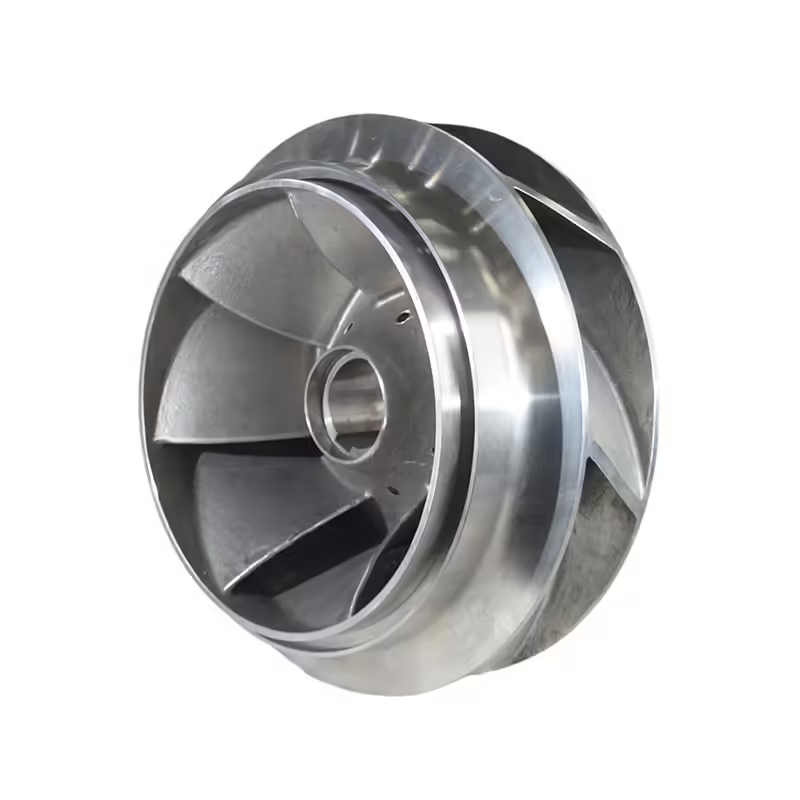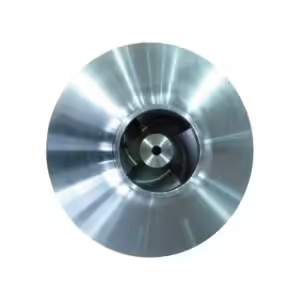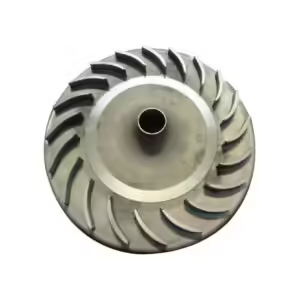6 razones principales para confiar en los impulsores de hierro fundido
¡Bienvenido a mi blog!
¡Me encanta tenerte aquí! Antes de profundizar en el contenido, me encantaría que me acompañaras en mis redes sociales. Es donde comparto información adicional, conecto con nuestra increíble comunidad y te mantengo al tanto de las últimas noticias. Así es como puedes mantenerte conectado:
📘 Facebook: Shanghai Leierwo Industria Comercio Co., Ltd.
¡Ahora, emprendamos este viaje juntos! Espero que el contenido aquí te resulte no solo revelador, sino también inspirador y valioso. ¡Comencemos!
Tabla de contenido
Introducción

A cast iron impeller is a key component in various pumping systems, known for its strength, reliability, and adaptability across industrial and commercial settings. As an essential part of centrifugal pumps and similar devices, the cast iron impeller plays a vital role in fluid movement, pressure generation, and energy efficiency. Whether you’re working in agriculture, water treatment, or manufacturing, selecting the right impeller can significantly influence the system’s performance.
This blog explores the top six reasons why professionals across industries continue to trust the cast iron impeller. From its unmatched durability to its cost-effectiveness, we will examine each aspect in detail. Through an evidence-backed approach, including a comparative table, we will show why the cast iron impeller remains a go-to solution in fluid dynamics.
1. Exceptional Durability of Impulsor de hierro fundido
One of the foremost qualities that set the cast iron impeller apart from alternatives is its exceptional durability. In various industries, including water treatment, mining, oil and gas, and agriculture, equipment is subjected to grueling daily operations. Cast iron, thanks to its dense microstructure and metallurgical composition, excels under such tough conditions. It does not easily crack, warp, or degrade over time, even when subjected to cyclic loads and extreme environmental factors.
In high-demand applications such as centrifugal and submersible pumps, the impeller must perform consistently under pressure, without succumbing to premature deterioration. A cast iron impeller offers precisely this reliability. It stands resilient against the mechanical wear that often plagues polymer or lighter metal counterparts, such as aluminum or bronze. The material’s wear resistance reduces the chances of damage from solid particles, grit, or turbulent flow, which are common in wastewater or slurry systems.
Long-term durability is more than just a technical benefit — it equates to substantial cost savings. When a cast iron impeller is used, fewer replacements are required, and the frequency of emergency shutdowns is drastically reduced. Maintenance intervals can be extended without compromising system efficiency. For industries where uptime is directly tied to profitability, the robust nature of the cast iron impeller makes it a dependable and strategic component.
2. High Mechanical Strength Under Pressure
In pump applications, especially those operating at medium to high pressures, mechanical integrity is non-negotiable. The cast iron impeller provides outstanding structural strength that holds up under high pressure and flow turbulence. Unlike some plastic or alloy impellers that may deform or fail due to pressure surges, cast iron impellers retain their shape and function over extended periods of use.
The internal forces acting on a rotating impeller — including centripetal forces, hydraulic loads, and thermal stress — can be significant. Cast iron, with its high compressive strength and rigidity, offers a material advantage in resisting these forces. This mechanical stability ensures that impellers do not warp or suffer dimensional inaccuracies that could compromise pump efficiency or damage internal components.
Moreover, in systems that pump viscous or particulate-laden fluids — such as mud, slurry, or effluent — the strength of the impeller is paramount. The cast iron impeller maintains performance consistency under such loads, resisting chipping, flexing, or erosion. This makes it ideal for operations in pulp and paper mills, mining tailings transport, and large-scale industrial processing where pressure conditions fluctuate regularly.
El cast iron impeller‘s mechanical strength also facilitates safe operation over a wider range of flow rates and pressures. It allows for engineering flexibility when designing or upgrading pumping systems without needing frequent calibration or reinforcement. This not only enhances system safety but also ensures long-term operational excellence.
3. Corrosion and Abrasion Resistance in Impulsor de hierro fundido
While cast iron is generally less corrosion-resistant than stainless steel or certain engineered polymers, it still offers a commendable level of protection — particularly when alloyed or treated appropriately. For example, the addition of elements such as nickel, chromium, or phosphorus can enhance its resistance to corrosive agents. Moreover, modern surface treatments and coatings can significantly improve the lifespan of a cast iron impeller used in chemically aggressive environments.
In systems where fluid media contain sand, silt, sediment, or chemical residues, the impeller’s surface is constantly bombarded with abrasive particles. Over time, this can cause pitting, scoring, and shape loss — severely degrading pump efficiency. The cast iron impeller, however, resists this wear thanks to its hardness and abrasion-resistant microstructure. Its ability to maintain geometric integrity allows for consistent hydraulic performance even under abrasive or erosive loads.
Industries such as wastewater treatment, chemical manufacturing, and dredging operations benefit significantly from this resistance. In these settings, it’s not unusual for pumps to operate continuously for months at a time without maintenance. The cast iron impeller’s rugged construction makes it a reliable solution that reduces operational risks.
Furthermore, in environments with fluctuating pH levels or sporadic exposure to harsh cleaning agents, the cast iron impeller remains serviceable with minimal degradation, especially if maintained properly. This adaptability makes it a favored option across various industries that require both strength and moderate corrosion protection.
4. Cost-Effectiveness and Availability

In today’s industrial landscape, balancing cost-efficiency with performance is paramount. Equipment investments must deliver not only operational excellence but also long-term value. The cast iron impeller strikes this balance effectively, offering a cost-effective alternative to higher-priced materials like stainless steel, titanium, or certain engineered polymers.
Compared to these premium materials, cast iron delivers impressive mechanical and hydraulic performance at a fraction of the cost. This makes it an ideal choice for facilities aiming to control budgets without sacrificing durability or reliability. In sectors such as agriculture, municipal utilities, chemical processing, and construction, budget constraints are real, and each component’s cost-performance ratio matters greatly. Opting for a cast iron impeller enables organizations to scale operations economically while ensuring critical systems remain operational and dependable.
Another important benefit is its wide market availability. Cast iron impellers are mass-produced globally due to their longstanding popularity. Whether for maintenance replacement or original system design, sourcing a cast iron impeller is straightforward. They’re manufactured in a variety of sizes, vane configurations, and pressure ratings, making them suitable for both low-flow and high-capacity systems.
This ready availability translates into faster procurement cycles, shorter lead times, and decreased equipment downtime. For industries where every hour of unplanned shutdown equates to financial loss, this factor cannot be overlooked. Maintenance crews can often locate a compatible impeller on short notice, which helps streamline repairs and upgrades.
Furthermore, the affordability of cast iron components supports bulk procurement and inventory stocking strategies. Organizations can keep spare impellers in storage without significant capital outlay. This ensures preparedness for unexpected breakdowns and enhances operational resilience.
5. Customization and Versatility
Customization is a critical aspect of fluid handling systems. No two pump systems are exactly alike — flow requirements, pressure ranges, fluid characteristics, and spatial constraints all vary depending on the application. Here, the cast iron impeller excels due to its design versatility and ease of fabrication.
Cast iron is highly machinable, allowing for precision manufacturing to tight tolerances. Whether you need a closed impeller to reduce leakage, a semi-open impeller for handling suspended solids, or an open impeller for ease of cleaning, cast iron can accommodate all three design variants with ease. Each design serves distinct operational goals, and cast iron adapts seamlessly to each form.
In addition to geometric customization, cast iron impellers can be enhanced through specialized coatings and surface treatments. Epoxy coatings, ceramic linings, rubber overlays, and other protective finishes can be applied to improve resistance to chemical attack, cavitation, and high-speed erosion. This allows engineers to extend the functionality of cast iron far beyond its base properties.
Such customization options are especially valuable in environments with unusual fluid dynamics — for example, when handling fluids with high viscosity, elevated temperatures, or solid content. Custom-formed cast iron impellers can be optimized to reduce turbulence, improve pump efficiency, and extend service life under unique operating conditions.
Moreover, the material’s stability allows for post-manufacturing adjustments. Impellers can be trimmed, balanced, or re-machined without losing structural integrity. This is a vital benefit for system upgrades or performance tuning. Engineers can fine-tune flow rates or head heights without replacing the entire impeller, leading to both technical and financial advantages.
6. Proven Track Record Across Industries

El cast iron impeller has a long-standing history of use across diverse sectors. From municipal water systems to oil refineries, its reliable performance is well-documented. This proven track record builds confidence in its continued usage, especially in mission-critical applications where failure is not an option.
Its widespread adoption is not just due to legacy systems but also because of consistent performance metrics, minimal maintenance requirements, and favorable lifecycle costs. For many engineers and plant operators, the cast iron impeller represents a trustworthy solution with a legacy of performance.
Table: Comparison of Common Impeller Materials
| Propiedad | Hierro fundido | Acero inoxidable | Bronce |
|---|---|---|---|
| Durabilidad | Alto | Muy alto | Medio |
| Resistencia a la corrosión | Moderado | Excelente | Bien |
| Abrasion Resistance | Alto | Medio | Medio |
| Costo | Bajo | Alto | Medio |
| Disponibilidad | Alto | Medio | Medio |
| Opciones de personalización | Alto | Medio | Alto |
This comparison table highlights how the cast iron impeller remains competitive against other popular materials. It provides an optimal blend of performance, affordability, and adaptability.
Conclusión
In summary, the cast iron impeller offers a compelling combination of strength, resistance, and affordability. Its ability to operate under pressure, resist wear, and be customized for specific uses makes it a dependable component across industries. With a legacy of performance and a proven track record, it continues to be a top choice for engineers and maintenance professionals alike.
Understanding these six core reasons to trust the cast iron impeller allows decision-makers to choose with confidence. It is not only about tradition or familiarity but about tangible benefits that directly impact operational efficiency and cost.
PREGUNTAS FRECUENTES
What is the primary use of a cast iron impeller?
Cast iron impellers are primarily used in centrifugal pumps to transfer fluids in municipal, agricultural, and industrial settings.
Is a cast iron impeller suitable for corrosive environments?
While cast iron offers moderate corrosion resistance, coatings or liners are recommended for high-corrosion applications.
How does a cast iron impeller compare to stainless steel?
Cast iron impellers are more affordable and durable for abrasive applications, while stainless steel is better for corrosive environments.
Can cast iron impellers be replaced easily?
Yes, due to their standardized design and widespread use, replacement parts are generally easy to source.
Son cast iron impellers customizable?
Yes, they can be manufactured in different shapes, sizes, and configurations depending on system requirements.
Categorías de productos
- Piezas de válvulas
- Piezas de la bomba de agua
- Piezas de la caja de cojinetes
- Piezas de fundición a presión
- Productos para bombas de acero inoxidable
- Productos para bombas de hierro fundido
- Piezas de válvulas para automóviles
- Recambios para automóviles
- Piezas de válvulas para uso civil
- Piezas de bomba de vacío KF

